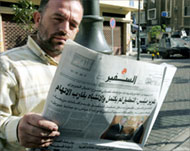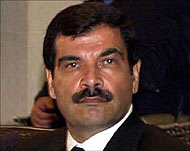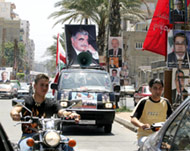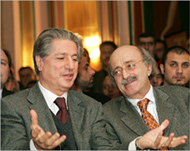Syria rejects UN report
Syria has rejected a UN investigation into the murder of a former Lebanese premier, calling it politically biased.

“It is a political statement against Syria based on allegations by witnesses known for their hostility to Syria,” Mehdi Dakhlallah, Syria’s information minister, told Aljazeera in the first official reaction from Damascus to the report.
Dakhlallah described the report as “100% politically biased” and said it was far from the truth.
The UN report implicated Syrian security services in the murder of former Lebanese prime minister Rafiq al-Hariri.
Led by veteran German prosecutor Detlev Mehlis, the probe into the 14 February assassination cited “converging evidence” of Syrian and Lebanese involvement and accused Damascus of blocking and misleading the investigation.
“There is probable cause to believe that the decision to assassinate … could not have been taken without the approval of top-ranked Syrian security officials and could not have been further organised without the collusion of their counterparts in the Lebanese security services,” the report said.
Syrian reaction
Syria, which pulled out its troops from Lebanon in April amid an international outcry over the al-Hariri killing, is braced for possible international sanctions over the report.
Speaking to Aljazeera, Information Minister Dakhlallah said: “It includes reports harming an independent and sovereign country such as Syria, with no evidence.
 |
|
The Mehlis report’s publication |
“I believe this report is far away from professionalism. I don’t believe it will lead us to the truth, but will be part of a great deception and tension in the area,” he said.
“The crime was political, and the motivations behind it were political,” Dakhlallah said.
“However, we are here talking about procedures and steps of an investigation into a specific crime.
“This means that the investigator should not be politically motivated. He should be professional. He should count on evidence, not on gossip, without actual examination of such sayings.”
Dangerous matter
“The matter is dangerous and related to dangerous accusations that may have serious political repercussions,” Dakhlallah said.
“Therefore, no report can be written without counting on evidence and proof that actually lead to the truth,” he said.
“The report comes as a part of a huge pressure campaign against Syria, a campaign that does not hesitate to accuse Syria of any harmful act in the world,” Dakhlallah said.
|
“No honest court can accept such a report which is based on gossip. We want a professional, honest and objective report to reach the truth” Mehdi Dakhlallah, |
“The content of the report contradicts the simplest conditions and methods of an investigation into such a big case, and even into a smaller one probing the murder of an ordinary person.“
He said: “No honest court can accept such a report which is based on gossip. We want a professional, honest and objective report to reach the truth.
“I don’t believe we are approaching the truth. On the contrary, this report is misleading. This misleading is against the truth and therefore against the interests of Syria, Lebanon and against independence in this region.”
Lebanon reaction
The Lebanese president’s office also criticised the report, with Emile Lahoud denying he had any contact with a suspect named by the UN report.
“The press office in the presidential palace categorically denies this information, which has no basis in truth and is a part of pressure campaigns against the president,” the presidential office said in a statement on Friday.
UN investigators reported on Thursday that a suspect had called Lahoud minutes before a truck bomb killed al-Hariri and 20 other people in Beirut in February.
 |
|
Emile Lahoud has denied any |
A pro-Syrian Palestinian leader also rejected on Friday accusations his group played a role in the killing of al-Hariri.
“We completely reject the implication of any of our factions in this case,” said Ahmed Jibril, head of the Damascus-based Popular Front for the Liberation of Palestine-General Command (PFLP-GC).
“We say we were surprised with the … report, which tried to implicate some of our factions by saying they gave some support to Lebanese security leaders,” he told Al-Arabiya television.
Mehlis’ report said people from Jibril’s group in Lebanon coordinated with Lebanese and Syrian security officials in their preparations for the truck bombing that killed al-Hariri and 20 others in Beirut.
“The Front is allied with Syria because Syria supports the Palestinian people and their cause,” he said. “We are ready today to present to the investigative committee and Lebanese judiciary whoever it calls.”
Al-Ahbash denial
The Mehlis report cited Ahmad Abdel-Al, a member of Lebanon’s al-Ahbash Islamic Association, a group with strong historical ties to the Syrian authorities, as a significant figure in the assassination plot, as he had used his mobile phone with “all the important figures in this investigation”.
There were numerous contacts between Abdel-Al and Lebanese state security on the day of the blast, including Brigadier-General Faysal Rasheed, chief of state security in Beirut, and others, the report said.
 |
|
Bashar al-Assad’s brother-in-law |
Abdel-Al’s brother, Mahmoud Abdel-Al “made a call minutes before the blast, at 1247 hours, to the mobile phone of Lebanese President Emile Lahoud”, it said.
In light of al-Ahbash connection, Abdelqader al-Fakhani, the press officer of group in Lebanon, was interviewed by Aljazeera on Thursday.
He started off by denouncing what he called the “media massacres” that took place overnight on some satellite channels.
“What we heard yesterday from some Arab satellite channels is totally different from what is stated in the report of the international probe committee,” he said.
“For example, some satellite channels, including a Lebanese one, said that Ahmad Abdel-Al, an al-Ahbash group official, is one of the main persons involved in al-Hariri’s assassination,” al-Fakhani said.
“Where did this channel bring this story from?” he asked.
Not implicated
Al-Fakhani said the Mehlis report neither implicated Abdel-Al nor the Ahbash group.
“We should not be accused. We reject these terrorist activities. We hope the report would present answers for those who want the truth, not for those who want fabrication and false accusations.”
 |
|
Lebanon’s political landscape was |
Al-Fakhani said the Mehlis report did not accuse Abdel-Al of anything, but merely mentioned a phone call between him and the Lebanese president [Emile Lahoud].
“Ahmad Abdel-Al, as the person in charge of public relations of Ahbash group, had phoned some Lebanese officials, particularly security officials, for help in fathoming the truth about who killed al-Hariri,” he said.
“First, the Lebanese presidency has denied any phone call between President Lahoud and Ahmad Abdel-Al a few minutes before the assassination,” al-Fakhani said.
“Second, even if the phone call had been made, does any citizen who calls the president of his country become a killer and a criminal?
Very odd
Al-Fakhani continued: “This is very odd, to expect our citizens not to call the president or ministers so as not to be labelled killers and criminals.”
He concluded: “We, al-Ahbash group, have no direct or indirect link to al-Hariri’s assassination. We hope media organisations will be objective and accurate.
“We call for the truth. We wish the international probe committee all success in its mission to reveal the whole truth and announce it to the Lebanese, Arab and international public opinion.”
 |
|
Amin Gemayel (L) says President |
Also interviewed on Aljazeera on Friday was Amin Gemayel, a former Lebanese president and leader of a prominent Christian faction. He said: “The accusing finger has, from the beginning, been pointed at the Lebanese-Syrian security regime which has operated in Lebanon for years. The [UN] report has now confirmed this.”
Speaking of the possible impact of the Mehlis report on current President Emile Lahoud, he said: “The Lebanese presidency has received its most serious blow since the extension of Lahoud’s three-year extension.
“This report, particularly the part mentioning President Lahoud, increases the troubles [Lahoud is already facing] and will lead to a big campaign against the Lebanese president, particularly given that the Lebanese security apparatus takes its instructions directly from the Lebanese and Syrian political authorities.”
Big network
Gemayel said contacts will be made and meetings will be held among his party and allies to discuss the steps to be adopted in the wake of the UN report’s disclosures.
He added: “It is clear that the Syrian and Lebanese security apparatuses have established a big network, including many organisations on the ground.
“They have also created some groups to be used as fronts, to release statements, stage demonstrations and carry out other political activities.”
On the brighter side, Gemayel said, some already established major political parties and organisations have not been mentioned in Mehlis’ report. “This is a positive point on which to maintain local unity and reconciliation,” he said.